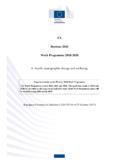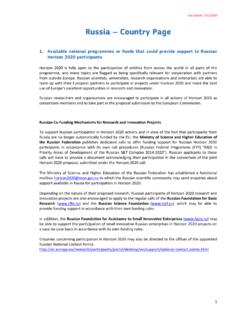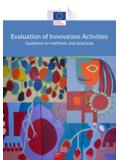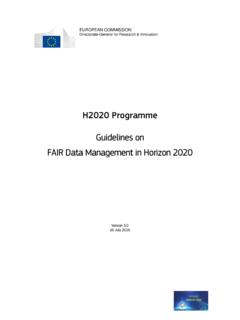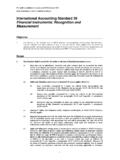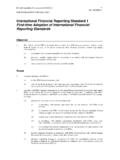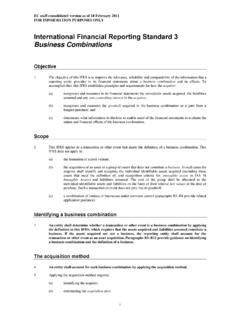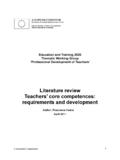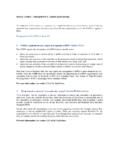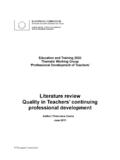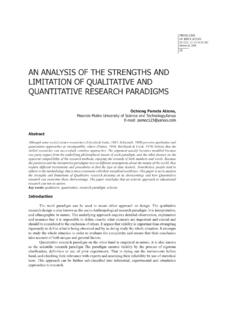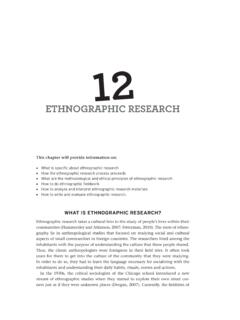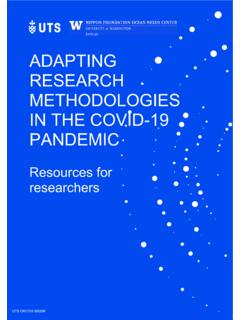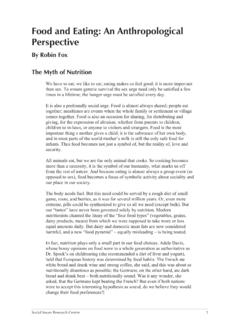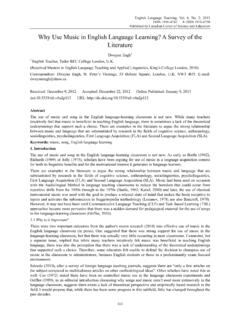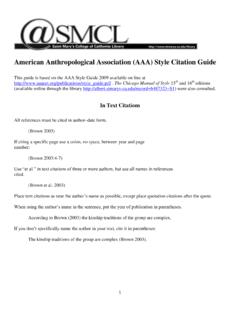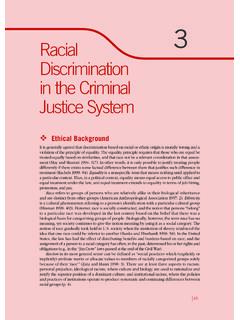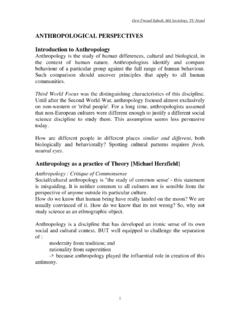Transcription of Research Ethics in Ethnography/Anthropology
1 Disclaimer This document is published by the European Commission, DG Research and Innovation. Neither the European Commission nor any person acting on their behalf is responsible for the use which might be made of the information contained herein or for any errors which, despite careful preparation and checking, may appear. This document has been drafted by a panel of experts at the request of the European Commission, DG Research and Innovation and constitute a guidance to raise awareness in the scientific community and does not constitute official EU guidance.
2 Research Ethics in Ethnography/Anthropology by Dr Ron Iphofen AcSS CONTENTS Section Page SUMMARY 2 Background 6 1 Terms, Concepts and Definitions 7 Disciplines and Method The broad theoretical assumptions of ethnography 9 Understanding and interpretation Social events are processual Naturalism Holism Multiple perspectives Ethnographic Research methods 10 Multiple methods/Triangulation Progressive focusing Reflexivity Establishing a role Theoretical sampling Analytic induction 2 Basic Principles of Research Ethics 12 Codes and Guidelines Ethical Principles 3 Formal ethical review criteria 13 4 Ethical Decision Making in Ethnographic and 15 anthropological Research .
3 A Justifiable interventions b Researchers competence 16 c Research Quality and Design 20 d Minimising Harm, Maximising Benefit 24 e Selecting, Recruiting, Retaining and Releasing Participants 27 f Giving Information and Seeking Consent 30 g Monitoring Safety 38 h Privacy and Confidentiality (strategies) 42 i Dealing with Vulnerability 50 j Involving Subjects in Research 55 k Disseminating Findings 59 l Implications of internet and e- Research for ethnography and anthropology 63 5 Conclusion 65 References 66 Online Sources 71 Glossary of Terms 73 1 SUMMARY There is great variety in Research methods in the social sciences and humanities (SSH), yet there are some fundamental ethical principles that are recognised by all.
4 Some methodologies are complex and/or unconventional in their approach and so give rise to difficult ethical decision taking. Anthropology is the study of all aspects of human culture. ethnography is a field-based Research method not unique to anthropology employing observation and interviewing to investigate social practices and the meanings behind social interaction. Ethnology involves the systematic comparison of different cultures using ethnographic Research methods to compare and contrast different cultures. The data produced tend to be descriptive and so require qualitative data analysis.
5 In order to understand human behaviour these approaches examine social processes in as natural a way as possible, using several connected Research methods that focus on social interaction and communications. A reflexive awareness by the researcher of their effects on the people being studied is encouraged usually through the use of a reflective journal written by the researcher. The basic ethical principles to be maintained include doing good, not doing harm and protecting the autonomy, wellbeing, safety and dignity of all Research participants.
6 Researchers should be as objective as possible and avoid ethnocentricity. Any deception of participants should be fully justified. They should not knowingly misrepresent or attempt to prevent reporting of misconduct, or obstruct the scientific Research of others. The contribution that can be made to advancing human knowledge by the SSH disciplines may be obstructed or undermined if inappropriate ethical review criteria are applied to Research proposals. Ethical review should be well informed, fair and transparent while seeking full justification for the proposed Research .
7 Ethical review should protect researchers, subjects and institutions in field sites from harm. Research Ethics committees should ask: who is doing the Research , what are they doing it for and how are they doing it? They should help in estimating risks of harm to participants, researchers and organisations and balance those against benefits that might accrue to society as outcomes of the Research . Committees should strive to be consistent in their judgments and in the advice they offer to researchers. 2 They should be as objective and transparent as possible and independent of institutional and professional biases and any form of vested interest.
8 Research proposals should never be rejected as a consequence of methodological ignorance, prejudice or the desire to manage a Research institution s corporate image. Above all ethical review must recognise that ethical decision making is not a static, one-off exercise. Only the field researcher truly confronts the unanticipated aspects of Research as it occurs spontaneously while the project is ongoing. Given the intrusive nature of ethnography and anthropology in people s lives there must be good reasons for conducting the Research . Managing the trust relationship between researchers and researched is vital.
9 ethnography is extremely skilled work and so requires competent, well-trained researchers, capable of making reasonable ethical judgments during the Research . Researchers have a responsibility to each other and to prevent doing harm that will undermine future Research work. Ethical codes have to be interpreted and put into practice by the researcher in light of the substantive Research topic and methodology employed. The manner in which Research is commissioned, by whom and how the relationship between researchers and commissioners is managed is a key determinant of ethical practice.
10 Poorly designed Research is unethical since it wastes researchers and subjects time and energy. Concern for the rights and well-being of Research participants lies at the root of ethical Research . Vulnerability is a prime concern and the very young and the very old, together with those with learning difficulties are seen to be worthy of special attention in most societies. In qualitative Research it may be impossible to maintain a neat distinction between covert and overt Research . Settings are often more complex and changeable than can be anticipated.
